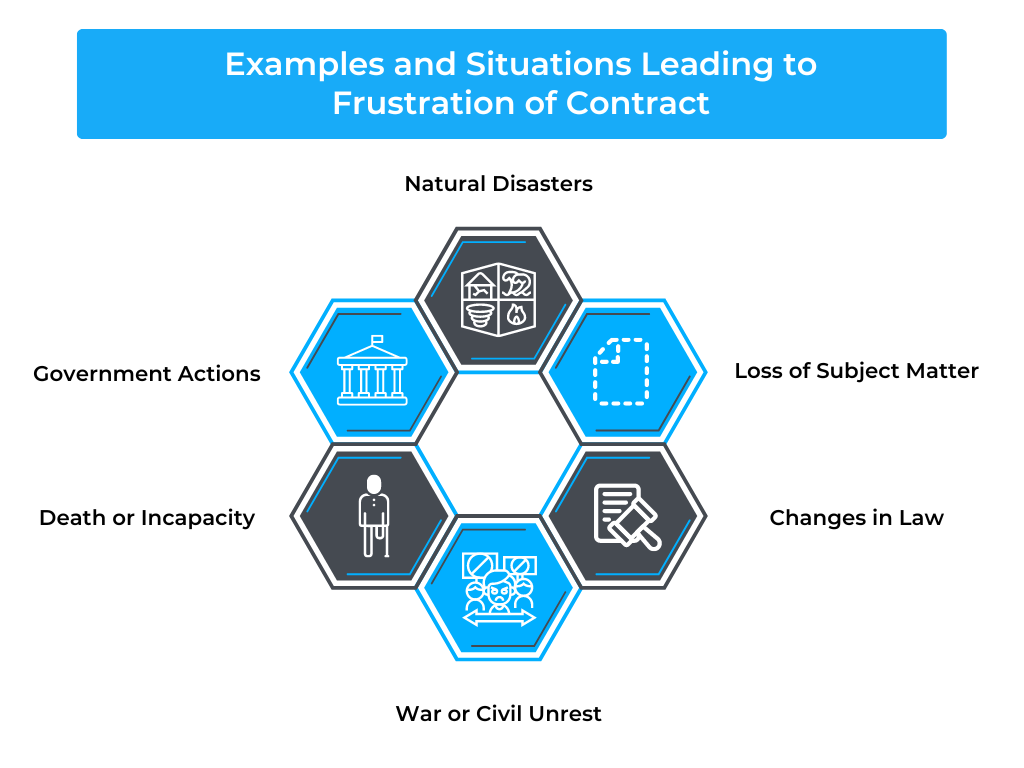Frustration of Contract
Introduction: Understanding Frustration of Contract

Frustration of a contract is a legal concept that arises when unforeseen circumstances make it impossible to fulfill the obligations of a contract. It occurs when an event occurs after the formation of the contract that fundamentally alters the nature of the contract or renders it impossible to perform. These events are often beyond the control of the parties involved and are considered to be outside the scope of what was contemplated at the time of contract formation.
The concept of frustration recognizes that in certain situations, it would be unfair or unreasonable to hold parties strictly accountable for performing a contract that has been rendered impossible or radically different due to unforeseen events. Frustration serves as a mechanism to discharge the parties from their contractual obligations and seeks to achieve a fair and equitable outcome in light of the changed circumstances. It is important to understand the elements, consequences, and remedies associated with frustration to navigate the complexities that may arise when a contract becomes frustrated.
Definition and Concept of Frustration
Frustration, in the context of contract law, refers to a situation where an unforeseen event occurs after the formation of a contract, making it impossible or radically different to perform the contractual obligations. It is an exceptional circumstance that disrupts the normal course of the contract and renders it impracticable or futile for the parties involved to continue with their respective obligations.
The concept of frustration recognizes that there are certain events beyond the control of the parties that can fundamentally alter the nature of the contract, making it unfair or unreasonable to expect them to fulfill their obligations. These events are often unforeseeable and occur due to external factors such as natural disasters, government actions, war, or significant changes in circumstances that were not contemplated at the time of contract formation.
When frustration occurs, it serves as a legal principle that allows the affected parties to be released from their contractual obligations. It prevents the parties from being unfairly burdened by circumstances that were unforeseeable and beyond their control.
Elements of Frustration: Requirements for Valid Claim
For a valid claim of frustration, certain elements must be present. These elements establish the basis for asserting that the contract has been frustrated and that the parties should be relieved from their obligations. The key requirements for a valid claim of frustration include:
- Unforeseen Event: The event that gives rise to frustration must be unforeseen and beyond the control of the parties at the time of contract formation. It should not have been anticipated or contemplated by the parties.
- Fundamental Change: The event must fundamentally alter the nature of the contract, rendering it impossible or radically different to perform. It must go to the root of the contract, making it commercially or practically impossible to carry out the original terms.
- No Fault of the Parties: The frustrating event should not be due to the fault or negligence of either party. If a party contributed to or caused the event, frustration may not be applicable.
- Objectively Impossible: The performance of the contract must be objectively impossible, not merely difficult or inconvenient. The event must render performance genuinely impossible, rather than just more onerous or unprofitable.
- No Fault of Party Seeking Relief: The party seeking to rely on frustration should not have voluntarily caused or assumed the risk of the frustrating event. They should have been unable to avoid or mitigate the impact of the event.
- Timing: Frustration is typically determined based on the circumstances existing at the time of the frustrating event. If the event was foreseeable or its effects were known before the contract was formed, frustration may not be applicable.
Examples and Situations Leading to Frustration of Contract

Frustration of contract can arise in various situations where unforeseen events occur, making it impossible or radically different to perform the contractual obligations. Some examples of events that may lead to frustration of contract include:
- Natural Disasters: Natural disasters such as earthquakes, hurricanes, floods, or wildfires can disrupt the ability to perform a contract. For instance, if a venue is destroyed by a fire before an event, it may be impossible to hold the event as originally planned.
- Government Actions: Changes in government regulations, laws, or orders can render a contract impossible to perform. For example, if the government imposes a ban on international travel, it may frustrate a contract for organizing a destination wedding abroad.
- Death or Incapacity: In situations where a person necessary for the performance of a contract passes away or becomes incapacitated, the contract may become impossible to fulfill. For instance, if a musician contracted for a concert becomes seriously ill, it may be impossible to hold the concert as scheduled.
- War or Civil Unrest: Outbreaks of war or civil unrest in a region can lead to frustration of contracts. For example, if a company has a contract to supply goods to an area affected by armed conflict, it may become impossible to deliver the goods due to safety concerns.
- Changes in Law: If there are significant changes in the law that render the contract illegal or impracticable to perform, frustration may occur. For instance, if a new law prohibits the sale of a particular product, a contract to supply that product may be frustrated.
- Loss of Subject Matter: If the subject matter of the contract is destroyed or becomes unavailable through no fault of the parties, frustration may arise. For example, if a building contracted for renovation is destroyed by fire, it may be impossible to carry out the renovation work as originally planned.
Legal Consequences and Effects of Frustration
When a contract is frustrated, it has certain legal consequences and effects on the parties involved. These consequences aim to address the unfairness and impracticability that arise due to unforeseen events. The legal implications of frustration include:
- Termination of Contract: Frustration of contract generally leads to the automatic termination of the agreement. The parties are discharged from their future obligations, and the contract becomes void from the time of frustration. This relieves the parties from the burden of performing the contract under radically changed or impossible circumstances.
- Obligations Cease: Once a contract is frustrated, the parties are relieved from their future obligations. This means that neither party can demand performance or seek damages for non-performance after the occurrence of the frustrating event. However, any obligations that have already been performed before the frustration event are unaffected.
- Restitution of Benefits: In cases of frustration, the law may provide for the restitution of benefits received by the parties prior to the occurrence of the frustrating event. This ensures fairness and prevents unjust enrichment. The restitution may involve the return of any money or property exchanged under the contract.
- Allocation of Losses: Frustration allocates the losses resulting from the frustration event between the parties. The general principle is that each party bears their own loss. However, in some cases, the law may provide for the allocation of losses based on factors such as the parties’ respective fault or the specific circumstances of the case.
- Rights and Obligations Cease Prospectively: Frustration operates retrospectively, meaning that it extinguishes future rights and obligations. However, any rights or obligations that have already accrued or matured before the frustration event continue to be enforceable.
- Limitations and Exceptions: It is important to note that the legal consequences of frustration may vary depending on the jurisdiction and applicable laws. Some contracts may include specific provisions regarding frustration, which can modify the general legal effects. Additionally, some jurisdictions may have statutory provisions or case law that provide additional guidance on the consequences of frustration.
Remedies and Considerations in Frustrated Contracts
When a contract becomes frustrated, certain remedies and considerations come into play to address the impact of the frustrating event. These remedies and considerations aim to achieve fairness and provide guidance on how to handle the situation. Some key remedies and considerations in the context of frustrated contracts include:
- Restitution: Restitution is a common remedy in frustrated contracts. It involves the return of any benefits received by either party prior to the occurrence of the frustrating event. This ensures that neither party is unjustly enriched as a result of the contract’s frustration.
- Limitation on Damages: Frustration typically limits the recovery of damages for non-performance of the contract. Since frustration is considered beyond the control of the parties, they are generally not liable for damages resulting from the non-performance caused by the frustrating event.
- Allocation of Losses: The allocation of losses is an important consideration in frustrated contracts. The general principle is that each party bears their own loss resulting from the frustration event. However, there may be exceptions or special circumstances that affect the allocation of losses, such as the parties’ respective fault or the terms of the contract itself.
- Negotiation and Renegotiation: In some cases, parties to a frustrated contract may choose to negotiate or renegotiate the terms of the agreement to accommodate the changed circumstances. This can involve modifying the obligations, timelines, or even terminating the contract by mutual agreement.
- Force Majeure Clauses: Force majeure clauses are contractual provisions that address unforeseen events that may affect the performance of a contract. In some cases, a force majeure clause may provide specific remedies or procedures to be followed in the event of frustration. Parties should review the contract to determine if a force majeure clause is present and its implications for the frustrated contract.
- Legal Advice: Given the complexities involved in frustrated contracts, seeking legal advice is advisable. An experienced lawyer can assess the specific circumstances, applicable laws, and contractual provisions to provide guidance on the available remedies, obligations, and potential legal implications.
Conclusion
In conclusion, frustration of contract is a legal concept that arises when unforeseen events make it impossible or radically different to perform a contract. It results in the termination of the contract and relieves the parties from future obligations. Restitution, limitation on damages, and negotiation are important considerations in dealing with frustrated contracts. Seeking legal advice is crucial to understand the specific implications and available remedies in such situations.
Try our Debt Resolution solutions today Request a Demo